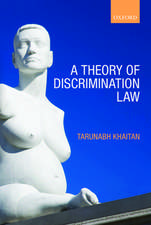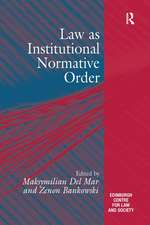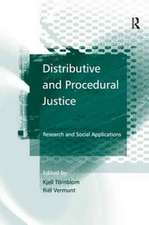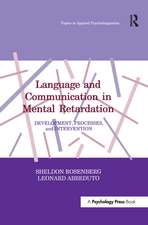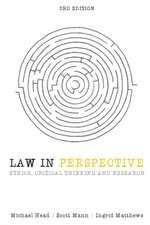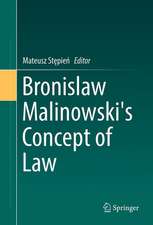Information Technology and Traditional Legal Concepts
Editat de Richard Jones, Roksana Mooreen Limba Engleză Paperback – 14 oct 2024
This book was published as a special issue of International review of Law Computers and Technology.
| Toate formatele și edițiile | Preț | Express |
|---|---|---|
| Paperback (1) | 219.28 lei 6-8 săpt. | |
| Taylor & Francis – 14 oct 2024 | 219.28 lei 6-8 săpt. | |
| Hardback (1) | 491.57 lei 6-8 săpt. | |
| Taylor & Francis – 10 noi 2010 | 491.57 lei 6-8 săpt. |
Preț: 219.28 lei
Preț vechi: 323.88 lei
-32% Nou
Puncte Express: 329
Preț estimativ în valută:
41.96€ • 43.81$ • 34.73£
41.96€ • 43.81$ • 34.73£
Carte tipărită la comandă
Livrare economică 05-19 aprilie
Preluare comenzi: 021 569.72.76
Specificații
ISBN-13: 9781032928913
ISBN-10: 1032928913
Pagini: 176
Dimensiuni: 174 x 246 mm
Greutate: 0.33 kg
Ediția:1
Editura: Taylor & Francis
Colecția Routledge
Locul publicării:Oxford, United Kingdom
ISBN-10: 1032928913
Pagini: 176
Dimensiuni: 174 x 246 mm
Greutate: 0.33 kg
Ediția:1
Editura: Taylor & Francis
Colecția Routledge
Locul publicării:Oxford, United Kingdom
Public țintă
Academic and PostgraduateCuprins
1. Introduction: An uncomfortable marriage: The challenges ‘new’ technology is posing to ‘old’ or established legal concepts? Richard Jones and Roksana Moore
2. Law shaping technology: Technology shaping the law David Flint
3. Protecting ‘privacy’ through control of ‘personal’ data processing: A flawed approach Karen McCullagh
4. Is it possible to define ‘privacies’ within the law? Reflections on the ‘securitisation’ debate and the interception of communications Dan Ritchie
5. Children’s data protection vs marketing companies Emmanuelle Bartoli
6. The UK 2007–2008 data protection fiasco: Moving on from bad policy and bad law? Joseph A. Cannataci and Jeanne Pia Mifsud Bonnici
7. Is identity theft really theft? Clare Sullivan
8. ‘Spam, spam, spam, spam . . . Lovely spam!’ Why is Bluespam different? Eleni Kosta, Peggy Valcke and David Stevens
9. Agents, Trojans and tags: The next generation of investigators Wiebke Abel
10. Technology and the cultural appropriation of music Richard Jones
11. Decentralised P2P technology: Can the unruly be ruled? Hasina Haque
12. The future of copyright in the age of convergence: Is a new approach needed for the new media world? Neal Geach
13. Copyright, contract and the protection of computer programs Ruth Dawn Atkins
2. Law shaping technology: Technology shaping the law David Flint
3. Protecting ‘privacy’ through control of ‘personal’ data processing: A flawed approach Karen McCullagh
4. Is it possible to define ‘privacies’ within the law? Reflections on the ‘securitisation’ debate and the interception of communications Dan Ritchie
5. Children’s data protection vs marketing companies Emmanuelle Bartoli
6. The UK 2007–2008 data protection fiasco: Moving on from bad policy and bad law? Joseph A. Cannataci and Jeanne Pia Mifsud Bonnici
7. Is identity theft really theft? Clare Sullivan
8. ‘Spam, spam, spam, spam . . . Lovely spam!’ Why is Bluespam different? Eleni Kosta, Peggy Valcke and David Stevens
9. Agents, Trojans and tags: The next generation of investigators Wiebke Abel
10. Technology and the cultural appropriation of music Richard Jones
11. Decentralised P2P technology: Can the unruly be ruled? Hasina Haque
12. The future of copyright in the age of convergence: Is a new approach needed for the new media world? Neal Geach
13. Copyright, contract and the protection of computer programs Ruth Dawn Atkins
Notă biografică
Richard Jones, Associate Editor, International Review, Law Computers and Technology has taught in areas of intellectual property and information technology law. He was invited by the Council of Europe to work in this area and awarded a Research fellowship with IBM to investigate legal expert systems. He was Chair of the British and Irish Legal Educational Technology Association (BILETA) and a Council member of the Society for Computers and the Law.
Roksana Moore, Lecturer in Law and Intellectual Property, School of Law, University of Southampton is researching in vendor liability for software defects. Her research interests also include software patents, ICT standardisation and traditional knowledge and intellectual property.
Roksana Moore, Lecturer in Law and Intellectual Property, School of Law, University of Southampton is researching in vendor liability for software defects. Her research interests also include software patents, ICT standardisation and traditional knowledge and intellectual property.
Descriere
The internet has changed perceptions of privacy, criminality and ownership this book questions whether the underlying legal concepts should also change.
This book was published as a special issue of International review of Law Computers and Technology.
This book was published as a special issue of International review of Law Computers and Technology.




